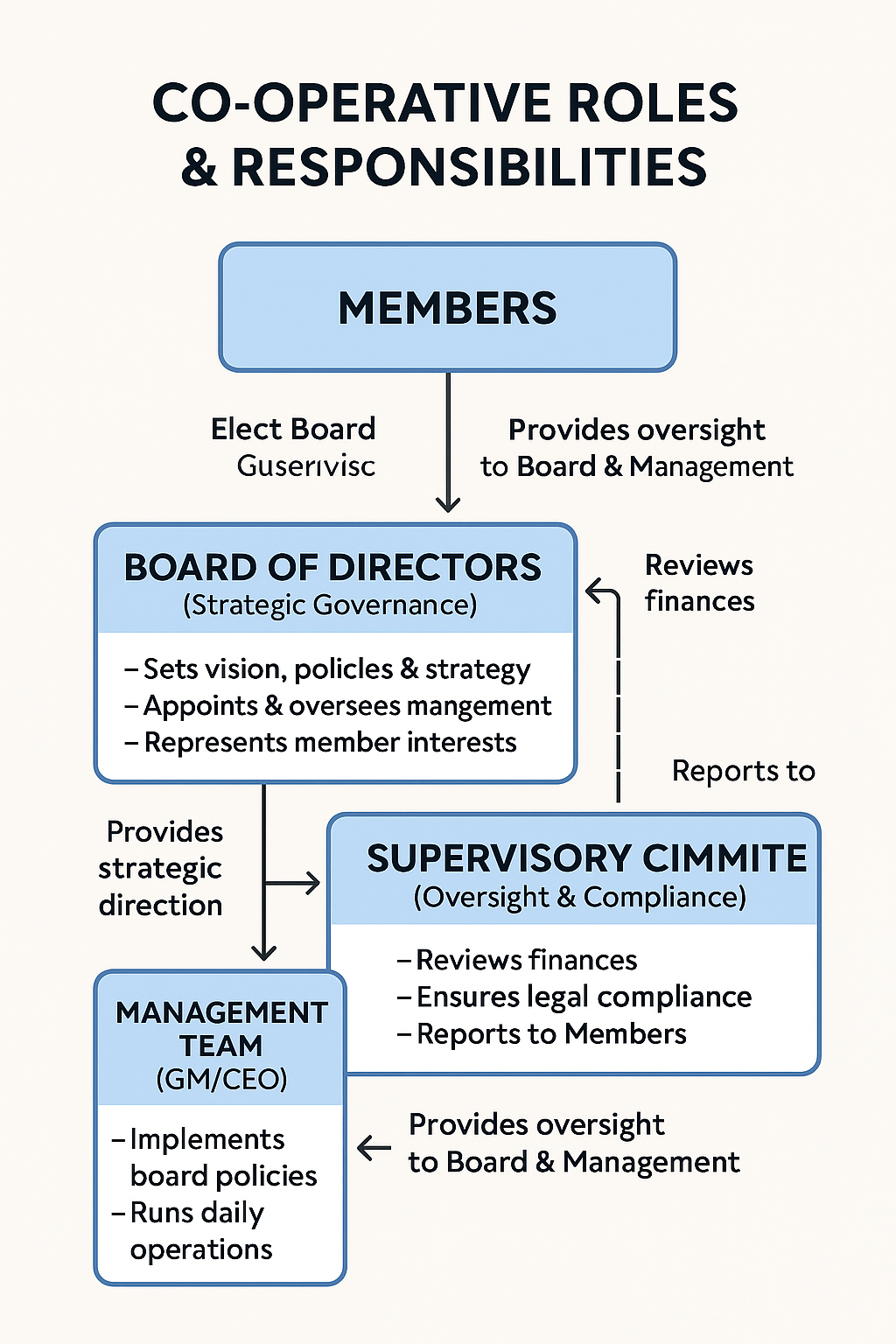

Aug
1
1
1 Aug 09:11 PM to 1 Aug 09:11 PM
Share this co-op meeting
In every successful cooperative, clarity of roles is essential for good governance, accountability and member trust. This webinar explores the distinct roles and responsibilities of the Board, management, supervisory committees, and members in a co-op structure. Whether you're a new leader or an experienced member, this session will help you understand who does what and why it matters. Learn how to avoid overstepping, strengthen checks and balances, and ensure your co-operative runs efficiently and transparently.
What You’ll Learn: The legal and ethical duties of board members, The boundary between governance and management, How members contribute to the success of the co-op, Building a culture of accountability and teamwork, Case studies from African co-operatives,
Who Should Attend: Board members, Co-op managers and staff, Supervisory committee members, General co-operative members, Cooperative development officers
What You’ll Learn: The legal and ethical duties of board members, The boundary between governance and management, How members contribute to the success of the co-op, Building a culture of accountability and teamwork, Case studies from African co-operatives,
Who Should Attend: Board members, Co-op managers and staff, Supervisory committee members, General co-operative members, Cooperative development officers
-
Public Co-op Meeting
-
1 Aug - 1 Aug
1 Aug 09:11 PM to 1 Aug 09:11 PM -
Hosted By Co-ops Africa Admin
-
7 Posts
-
2 Photos
-
Videos
-
Reviews
-
N/A
Recent Updates
-
0 Comments 0 Shares 513 Views 0 ReviewsPlease log in to like, share and comment!
-
Strong Co-operatives Are Built on Clear Roles
Africa’s future is being shaped not just by governments and corporations, but by ordinary people coming together — pooling resources, sharing risks, and building something greater than themselves. That is the spirit of co-operation. But co-operation is not chaos. It demands order, structure, and clarity. And one of the most important foundations of any successful co-operative is a clear understanding of roles and responsibilities.
When everyone knows what is expected of them — and equally important, what is not — the co-operative thrives. But when roles are unclear, misunderstood, or ignored, even the best intentions can lead to dysfunction.
The Board: Custodians of Purpose
The board of directors is not there to run the co-operative on a day-to-day basis. It exists to govern, not to manage. The board acts on behalf of the members to preserve the co-operative’s mission, guide its long-term direction, and protect its values. That means setting policies, making key financial decisions, approving budgets, and holding the general manager accountable. The board must stay out of operational details and focus on governance. Their strength lies in vision and oversight, not in micromanagement.
The Manager: Translating Vision into Action
Once the board sets direction, the manager and their team are responsible for turning that vision into daily reality. From managing member services to maintaining inventory, preparing reports, and supervising staff, the manager ensures that the co-operative functions as a business. Good managers are leaders in their own right — they do not wait for instructions on every detail but understand how to work within the board’s guidance to deliver results. They manage people, systems, and relationships while keeping communication open with the board.
The Supervisory Committee: The Voice of Integrity
In many co-operatives, a supervisory or audit committee plays an independent role in checking compliance, finances, and adherence to the rules. This committee must have the freedom and courage to raise the alarm when something is wrong — even if it’s uncomfortable. Their reports protect the interests of all members. They are the guardians of integrity and financial honesty, ensuring the board and management act within the co-operative’s agreed framework.
The Members: Owners, Watchdogs, and Builders
Members are not just customers. They are co-owners. They are the lifeblood of the co-operative. Yet too often, members remain passive, unaware of their power. A strong co-operative encourages active membership — members who attend meetings, vote in elections, ask questions, challenge poor leadership, and even serve in governance when called upon.
Without active members, democracy dies. Leadership loses its way. Accountability disappears. When members show up and speak out, they strengthen the very foundation of the co-operative.
What Happens When Roles Are Not Respected?
When board members begin giving instructions to junior staff, or when managers make decisions that belong to the board, problems arise. Conflict grows. Decisions get delayed. Trust erodes. The co-operative stalls or even collapses. It’s like a football team where every player chases the ball — nobody is guarding the goalpost, nobody is passing. It becomes chaos.
Co-ops are built to function like an orchestra — different instruments playing in harmony, each with a clear part. When each role is respected, the music is beautiful. When roles are confused, it becomes noise.
The Call: Let Us Build Accountable Co-operatives
What we need across Africa today are co-operatives with discipline, structure, and shared responsibility. Co-operatives that don’t just promise empowerment but practice good governance. Where the board leads, the manager manages, and members are actively engaged. This requires training. It requires dialogue. But most of all, it requires commitment to the co-operative spirit.
Let us each ask ourselves: Do I understand my role?, Do I respect the boundaries of others?, Am I holding myself accountable — or waiting for others to lead?
Conclusion: The Future Belongs to Co-ops That Work
The future of African development lies in communities that organize, produce, and trade together — in unity. But unity requires order. It requires trust. And trust begins with clear roles.
If we want to see stronger, more resilient co-operatives in Africa — from SACCOs in rural villages to industrial worker co-ops in cities — we must go back to the basics.
Let us get our roles right. Let us co-operate with purpose.
Thank you.Strong Co-operatives Are Built on Clear Roles Africa’s future is being shaped not just by governments and corporations, but by ordinary people coming together — pooling resources, sharing risks, and building something greater than themselves. That is the spirit of co-operation. But co-operation is not chaos. It demands order, structure, and clarity. And one of the most important foundations of any successful co-operative is a clear understanding of roles and responsibilities. When everyone knows what is expected of them — and equally important, what is not — the co-operative thrives. But when roles are unclear, misunderstood, or ignored, even the best intentions can lead to dysfunction. The Board: Custodians of Purpose The board of directors is not there to run the co-operative on a day-to-day basis. It exists to govern, not to manage. The board acts on behalf of the members to preserve the co-operative’s mission, guide its long-term direction, and protect its values. That means setting policies, making key financial decisions, approving budgets, and holding the general manager accountable. The board must stay out of operational details and focus on governance. Their strength lies in vision and oversight, not in micromanagement. The Manager: Translating Vision into Action Once the board sets direction, the manager and their team are responsible for turning that vision into daily reality. From managing member services to maintaining inventory, preparing reports, and supervising staff, the manager ensures that the co-operative functions as a business. Good managers are leaders in their own right — they do not wait for instructions on every detail but understand how to work within the board’s guidance to deliver results. They manage people, systems, and relationships while keeping communication open with the board. The Supervisory Committee: The Voice of Integrity In many co-operatives, a supervisory or audit committee plays an independent role in checking compliance, finances, and adherence to the rules. This committee must have the freedom and courage to raise the alarm when something is wrong — even if it’s uncomfortable. Their reports protect the interests of all members. They are the guardians of integrity and financial honesty, ensuring the board and management act within the co-operative’s agreed framework. The Members: Owners, Watchdogs, and Builders Members are not just customers. They are co-owners. They are the lifeblood of the co-operative. Yet too often, members remain passive, unaware of their power. A strong co-operative encourages active membership — members who attend meetings, vote in elections, ask questions, challenge poor leadership, and even serve in governance when called upon. Without active members, democracy dies. Leadership loses its way. Accountability disappears. When members show up and speak out, they strengthen the very foundation of the co-operative. What Happens When Roles Are Not Respected? When board members begin giving instructions to junior staff, or when managers make decisions that belong to the board, problems arise. Conflict grows. Decisions get delayed. Trust erodes. The co-operative stalls or even collapses. It’s like a football team where every player chases the ball — nobody is guarding the goalpost, nobody is passing. It becomes chaos. Co-ops are built to function like an orchestra — different instruments playing in harmony, each with a clear part. When each role is respected, the music is beautiful. When roles are confused, it becomes noise. The Call: Let Us Build Accountable Co-operatives What we need across Africa today are co-operatives with discipline, structure, and shared responsibility. Co-operatives that don’t just promise empowerment but practice good governance. Where the board leads, the manager manages, and members are actively engaged. This requires training. It requires dialogue. But most of all, it requires commitment to the co-operative spirit. Let us each ask ourselves: Do I understand my role?, Do I respect the boundaries of others?, Am I holding myself accountable — or waiting for others to lead? Conclusion: The Future Belongs to Co-ops That Work The future of African development lies in communities that organize, produce, and trade together — in unity. But unity requires order. It requires trust. And trust begins with clear roles. If we want to see stronger, more resilient co-operatives in Africa — from SACCOs in rural villages to industrial worker co-ops in cities — we must go back to the basics. Let us get our roles right. Let us co-operate with purpose. Thank you.0 Comments 0 Shares 510 Views 0 Reviews -
The Critical Role of Clear Responsibilities in Co-operative Success
Co-operatives thrive when there is clarity about who is responsible for what. This clarity is essential not only to avoid conflict but to ensure that the co-operative operates efficiently and transparently. Without well-defined roles and responsibilities, overlapping duties or gaps emerge, causing confusion, inefficiency, and even mistrust among members and leaders. In African co-operatives, where community trust and collective ownership are fundamental, understanding and respecting each role is the foundation upon which success is built.
The Board of Directors: Strategic Leaders and Guardians of Governance
The board of directors holds the ultimate responsibility for the governance of the co-operative. Their role is primarily strategic — setting the vision, defining policies, and making high-level decisions that shape the future of the organization. They are elected by the members to represent their interests and ensure the co-operative stays true to its principles and legal requirements. Importantly, the board is not involved in managing daily operations; instead, it oversees and guides management, approving budgets, monitoring financial health, and ensuring compliance with laws and co-operative by-laws. A well-functioning board provides leadership, accountability, and stewardship without micromanaging.
Management: The Operational Backbone Driving Execution
While the board governs, management is responsible for implementing the board’s policies and running the day-to-day operations of the co-operative. This includes managing staff, overseeing member services, handling finances, and ensuring the smooth delivery of products or services. Effective management requires operational expertise, leadership skills, and the ability to communicate clearly with both the board and members. Good managers translate strategic objectives into practical actions and results, while reporting regularly to the board on performance, challenges, and opportunities.
Supervisory Committees: Ensuring Oversight and Compliance
Many co-operatives establish supervisory or audit committees as independent bodies to provide oversight. These committees serve as internal watchdogs, reviewing financial records, operational compliance, and adherence to co-operative rules. Their role is critical in detecting irregularities, preventing fraud, and promoting transparency. By reporting findings to the membership and the board, the supervisory committee strengthens governance structures and reassures members that the co-operative is being managed responsibly.
Members: The Heart and True Owners of the Co-operative
Members are not merely beneficiaries but the owners of the co-operative. Their active participation is essential for democratic governance and sustainability. Members have the right — and responsibility — to attend meetings, vote on key decisions, elect leadership, and hold them accountable. When members are engaged and informed, they contribute ideas, monitor leadership performance, and foster a culture of shared responsibility. A co-operative with passive members risks weak leadership and reduced community impact.
The Dangers of Role Confusion and Overlap
When the lines between governance and management blur, problems often arise. Boards that intervene in daily management risk stifling operational efficiency, while managers making strategic decisions can bypass important member oversight. Similarly, when members do not understand their rights and responsibilities, they may disengage or allow leadership to act without scrutiny. Such role confusion breeds conflict, mistrust, and inefficiency, which can threaten the very existence of the co-operative.
Fostering a Culture of Accountability and Respect
Clarity of roles alone is not enough. A culture of accountability, respect, and collaboration among boards, management, supervisory bodies, and members is essential. This means that each group not only knows their responsibilities but also respects the boundaries of others’ roles. It requires open communication, transparency, and regular education and training. When a co-operative fosters mutual respect and accountability, it creates an environment where challenges are addressed constructively, and the organization grows stronger.
Conclusion: Roles and Responsibilities as Pillars of Sustainable Co-operatives
Strong African co-operatives are built on the pillars of clearly defined roles and shared responsibility. When boards govern effectively, management executes efficiently, supervisory committees oversee diligently, and members participate actively, the co-operative can achieve its mission of improving livelihoods and empowering communities. Clarity and respect for roles build trust, enhance performance, and ensure the sustainability of co-operative enterprises. Let us all commit to understanding our roles and working together for the success of our co-operatives.
The Critical Role of Clear Responsibilities in Co-operative Success Co-operatives thrive when there is clarity about who is responsible for what. This clarity is essential not only to avoid conflict but to ensure that the co-operative operates efficiently and transparently. Without well-defined roles and responsibilities, overlapping duties or gaps emerge, causing confusion, inefficiency, and even mistrust among members and leaders. In African co-operatives, where community trust and collective ownership are fundamental, understanding and respecting each role is the foundation upon which success is built. The Board of Directors: Strategic Leaders and Guardians of Governance The board of directors holds the ultimate responsibility for the governance of the co-operative. Their role is primarily strategic — setting the vision, defining policies, and making high-level decisions that shape the future of the organization. They are elected by the members to represent their interests and ensure the co-operative stays true to its principles and legal requirements. Importantly, the board is not involved in managing daily operations; instead, it oversees and guides management, approving budgets, monitoring financial health, and ensuring compliance with laws and co-operative by-laws. A well-functioning board provides leadership, accountability, and stewardship without micromanaging. Management: The Operational Backbone Driving Execution While the board governs, management is responsible for implementing the board’s policies and running the day-to-day operations of the co-operative. This includes managing staff, overseeing member services, handling finances, and ensuring the smooth delivery of products or services. Effective management requires operational expertise, leadership skills, and the ability to communicate clearly with both the board and members. Good managers translate strategic objectives into practical actions and results, while reporting regularly to the board on performance, challenges, and opportunities. Supervisory Committees: Ensuring Oversight and Compliance Many co-operatives establish supervisory or audit committees as independent bodies to provide oversight. These committees serve as internal watchdogs, reviewing financial records, operational compliance, and adherence to co-operative rules. Their role is critical in detecting irregularities, preventing fraud, and promoting transparency. By reporting findings to the membership and the board, the supervisory committee strengthens governance structures and reassures members that the co-operative is being managed responsibly. Members: The Heart and True Owners of the Co-operative Members are not merely beneficiaries but the owners of the co-operative. Their active participation is essential for democratic governance and sustainability. Members have the right — and responsibility — to attend meetings, vote on key decisions, elect leadership, and hold them accountable. When members are engaged and informed, they contribute ideas, monitor leadership performance, and foster a culture of shared responsibility. A co-operative with passive members risks weak leadership and reduced community impact. The Dangers of Role Confusion and Overlap When the lines between governance and management blur, problems often arise. Boards that intervene in daily management risk stifling operational efficiency, while managers making strategic decisions can bypass important member oversight. Similarly, when members do not understand their rights and responsibilities, they may disengage or allow leadership to act without scrutiny. Such role confusion breeds conflict, mistrust, and inefficiency, which can threaten the very existence of the co-operative. Fostering a Culture of Accountability and Respect Clarity of roles alone is not enough. A culture of accountability, respect, and collaboration among boards, management, supervisory bodies, and members is essential. This means that each group not only knows their responsibilities but also respects the boundaries of others’ roles. It requires open communication, transparency, and regular education and training. When a co-operative fosters mutual respect and accountability, it creates an environment where challenges are addressed constructively, and the organization grows stronger. Conclusion: Roles and Responsibilities as Pillars of Sustainable Co-operatives Strong African co-operatives are built on the pillars of clearly defined roles and shared responsibility. When boards govern effectively, management executes efficiently, supervisory committees oversee diligently, and members participate actively, the co-operative can achieve its mission of improving livelihoods and empowering communities. Clarity and respect for roles build trust, enhance performance, and ensure the sustainability of co-operative enterprises. Let us all commit to understanding our roles and working together for the success of our co-operatives.0 Comments 0 Shares 532 Views 0 Reviews -
Title: Knowing Your Role: The Foundation of a Successful Co-operative
Good day, fellow co-operators, ladies and gentlemen,
It is an honour to be here today to speak on a subject that lies at the very heart of every successful co-operative: knowing your role.
In Africa, co-operatives have always been a way for ordinary people to pool their strengths, solve their problems, and build a better future together. Whether it’s in farming, housing, transport, or finance — the co-operative model works best when each person understands their responsibility and stays in their lane.
But far too often, we have seen confusion in co-ops: Board members who start managing staff directly, Managers who make decisions meant for the board, Members who think their job is to only show up once a year at the AGM.
This confusion leads to poor governance, internal conflict, and financial loss — not because the people are not capable, but because the roles are not clearly understood or respected.
Let’s break this down:
1. The Role of the Board of Directors:- The board is the governing body of the co-operative. Its job is to provide strategic direction and make sure the co-op stays true to its mission. The board does not manage day-to-day operations — that’s for the management team. Instead, the board must: Set policies, Hire and supervise the general manager, Approve budgets, and Monitor performance. In short, the board governs. It does not interfere with daily transactions or micromanage staff.
2. The Role of Management:- Management is responsible for the day-to-day execution of the board’s decisions. They run the business, serve the members, handle operations, and lead the staff. They report to the board and follow approved policies. Their strength lies in operational leadership — they make things happen.
3. The Role of the Supervisory Committee:- This is the watchdog of the co-operative. They ensure compliance, review finances, and make sure both board and management are working in line with the by-laws. Their job is not to control but to oversee and report. They help keep the co-op honest, transparent, and accountable.
4. The Role of Members:- And what about the members — the true owners of the co-op? Members are not passive spectators. They must: Attend meetings, Elect leaders wisely, Hold them accountable, and Participate in decisions that affect the direction of the co-op.
A silent membership leads to weak co-operatives. A strong, active membership builds resilience.
So, why does all this matter? Because when roles are respected: Decisions are faster and more effective, Conflict is reduced, Trust is built, And ultimately, the co-operative grows.
But when roles are confused, the co-operative becomes dysfunctional. People start blaming each other, members lose confidence, and good leaders resign in frustration.
Let me leave you with this: “Structure before success.”
No matter how big your dreams are for your co-operative — whether it’s expanding to new markets, increasing member benefits, or investing in new technology — you must begin with structure and clarity of roles.
Let us build co-operatives where everyone knows their role, plays their part, and respects the process. That is the only way we will create sustainable, African-owned institutions that serve generations to come.
Thank you.
Title: Knowing Your Role: The Foundation of a Successful Co-operative Good day, fellow co-operators, ladies and gentlemen, It is an honour to be here today to speak on a subject that lies at the very heart of every successful co-operative: knowing your role. In Africa, co-operatives have always been a way for ordinary people to pool their strengths, solve their problems, and build a better future together. Whether it’s in farming, housing, transport, or finance — the co-operative model works best when each person understands their responsibility and stays in their lane. But far too often, we have seen confusion in co-ops: Board members who start managing staff directly, Managers who make decisions meant for the board, Members who think their job is to only show up once a year at the AGM. This confusion leads to poor governance, internal conflict, and financial loss — not because the people are not capable, but because the roles are not clearly understood or respected. Let’s break this down: 1. The Role of the Board of Directors:- The board is the governing body of the co-operative. Its job is to provide strategic direction and make sure the co-op stays true to its mission. The board does not manage day-to-day operations — that’s for the management team. Instead, the board must: Set policies, Hire and supervise the general manager, Approve budgets, and Monitor performance. In short, the board governs. It does not interfere with daily transactions or micromanage staff. 2. The Role of Management:- Management is responsible for the day-to-day execution of the board’s decisions. They run the business, serve the members, handle operations, and lead the staff. They report to the board and follow approved policies. Their strength lies in operational leadership — they make things happen. 3. The Role of the Supervisory Committee:- This is the watchdog of the co-operative. They ensure compliance, review finances, and make sure both board and management are working in line with the by-laws. Their job is not to control but to oversee and report. They help keep the co-op honest, transparent, and accountable. 4. The Role of Members:- And what about the members — the true owners of the co-op? Members are not passive spectators. They must: Attend meetings, Elect leaders wisely, Hold them accountable, and Participate in decisions that affect the direction of the co-op. A silent membership leads to weak co-operatives. A strong, active membership builds resilience. So, why does all this matter? Because when roles are respected: Decisions are faster and more effective, Conflict is reduced, Trust is built, And ultimately, the co-operative grows. But when roles are confused, the co-operative becomes dysfunctional. People start blaming each other, members lose confidence, and good leaders resign in frustration. Let me leave you with this: “Structure before success.” No matter how big your dreams are for your co-operative — whether it’s expanding to new markets, increasing member benefits, or investing in new technology — you must begin with structure and clarity of roles. Let us build co-operatives where everyone knows their role, plays their part, and respects the process. That is the only way we will create sustainable, African-owned institutions that serve generations to come. Thank you.0 Comments 0 Shares 491 Views 0 Reviews -
0 Comments 0 Shares 514 Views 0 Reviews
More Stories
Join the event to join Co-op Talk

Co-ops Africa
https://login.coops.africa



